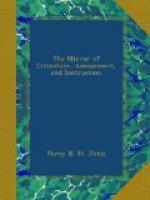Dr. Abercrombie, in his work on the Intellectual Powers, has recorded several instances of remarkable dreams.—Among them is the following extraordinary instance of the power which may be exercised over some persons while asleep, of creating dreams by whispering in their ears. An officer in the expedition to Lanisburg, in 1758, had this peculiarity in so remarkable a degree, that his companions in the transport were in the constant habit of amusing themselves at his expense. It had more effect when the voice was that of a friend familiar to him. At one time they conducted him through the whole progress of a quarrel, which ended in a duel, and when the parties were supposed to be met, a pistol was put into his hand, which he fired, and was awakened by the report. On another occasion they found him asleep on the top of a locker, or bunker, in the cabin, when they made him believe he had fallen overboard, and exhorted him to save himself by swimming. They then told him a shark was pursuing him, and entreated him to dive for his life; this he instantly did, but with such force as to throw himself from the locker to the cabin floor, by which he was much bruised, and awakened of course. After the landing of the army at Lanisburg, his companions found him one day asleep in the tent, and evidently much annoyed by the cannonading. They then made him believe he was engaged, when he expressed great fear, and an evident disposition to run away. Against this they remonstrated, but at the same time increased his fears by imitating the groans of the wounded and the dying; and when he asked, as he sometimes did, who were down, they named his particular friends. At last they told him that the man next him in the line had fallen, when he instantly sprang from his bed, rushed out of the tent, and was roused from his danger and his dream together, by falling over the tent ropes.
By the by, all this is quite contrary to Dryden’s theory, who says—
“As one who in a frightful dream
would shun
His pressing foe, labours in vain
to run;
And his own slowness in his sleep bemoans,
With thick short sighs, weak cries, and
tender groans.”
And again, in his Virgil—
“When heavy sleep has closed the sight, And sickly fancy labours in the night, We seem to run, and, destitute of force, Our sinking limbs forsake us in the course; In vain we heave for breath—in vain we cry— The nerves unbraced, their usual strength deny, And on the tongue the flattering accents die.”
Now this man seems to have had the use not only of his limbs, but of his faculty of speech, while dreaming; and it was not till after he awoke that he felt the oppression Dryden describes; for it is stated, that when he awoke he had no distinct recollection of his dream, but only a confused feeling of oppression and fatigue, and used to tell his companions that he was sure they had been playing some trick upon him.




